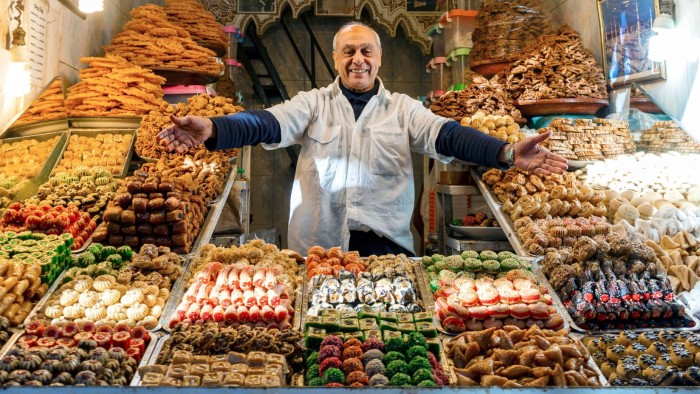Unlock the Editor’s Digest for free
Roula Khalaf, Editor of the FT, selects her favourite stories in this weekly newsletter.
The writer is an author of fiction, cookery books and poetry anthologies. Her latest book is ‘The Dinner Table’, a collection of food writing
Too many cooks spoil the broth, but what about the baklava? Chaos in the kitchen this week, as two Australian chefs, both shortlisted for a prestigious cookbook prize, claim to have devised an identical recipe for the dessert. Also, caramel slice. (And, alleges a third chef, isn’t that my recipe for vanilla cake?)
It’s hard for me to imagine a recipe for baklava, caramel slice or vanilla cake that is so startlingly original that I would know, without a doubt, that it was mine. You can only combine milk, sugar and eggs in so many ways to get the same result. Then again, MasterChef UK fans will recall with horror the humbling of the contestant who foolishly presented Marcus Wareing with a Marcus Wareing custard tart.
If you read a lot of recipes, you start to notice patterns. I can’t count how many I’ve looked at and realised, halfway down the ingredients list, that the numbers have simply been doubled and changed from metric to imperial (or vice versa), and I know this because it’s a recipe I’ve already read somewhere else.
Listen: I get it. Every cookbook writer I know loves to read cookbooks. And if you cook a lot, it’s hard to know exactly what bit came from which friend, which book, which random blog or half-forgotten old TV show. There are millions of recipes online and someone has probably had the same idea as you somewhere along the line. You Google yours, find theirs, and what then? You don’t try their technique to see if it’s better than yours? And if it is, you don’t write that down and follow it?
Originality is hard to come by in a world as big and as small as ours. I can think of maybe 15 truly original recipes I’ve read in the past 10 years. Every other one I’ve loved — and there have been a lot of them — I could probably trace back to source. Theoretically, a person could draw an enormous map of influence, inspiration, imitation — and, yes, probably plagiarism too — of every cook who ever cooked.
Which is the whole point.
This particular row over baklava feels a little like a storm in a cupcake. (Now there’s an original idea.) But the principle is worth thinking about. It is both indefensible and indefensibly stupid to copy a recipe gramme for gramme from a direct competitor — especially when giving credit is so easy.
Open pretty much any modern cookbook, and you’ll stumble sooner or later across a recipe attributed to another chef. Usually — ideally — the attribution will garland the original cook with praise, explain why exactly this recipe is so good and encourage you to buy the book. It’s one of the things I love most about cookbooks: by buying one £26 hardback, I’m also getting a reading list of what to cook next, and who to trust.
In a world where ChatGPT can design you a brand new weekly menu, it’s hard not to wonder what we’re doing, the food writers of this world. You can get a recipe anywhere, for anything, for free. Why buy a cookbook, unless you really trust the writer? Why buy a cookbook at all, except because you have a connection with the writer that no artificial intelligence can ever replicate? And if you’re the writer, why not share your own connections?
The real threat to original writing is not each other, it’s wholesale plagiarism by AI, and the only way to combat a neural network is to create a robust, thoughtful network of our own. Me, in my kitchen; you, in yours; everyone who taught me to cook, everywhere in the world, in theirs.
It seems unlikely that any of the chefs in question came up with a recipe for baklava — a 15th-century idea — that owed nothing to their culinary ancestors. How much more miraculous is it to realise that across hundreds of years and thousands of miles, we’re all hoping for a touch of the same sweetness? And how much sweeter to acknowledge it?
